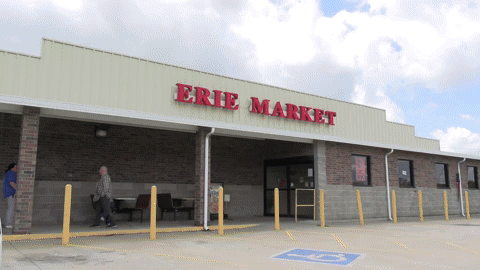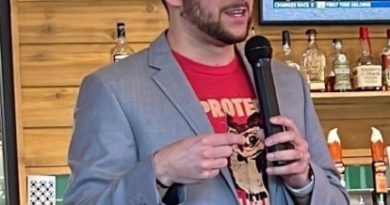Solutions to food deserts may lie in one SEK town
by AJ Kohler
ARMA, Kan. — Two years ago, Arma lost its only grocery store, Arma Supermarket, joining a growing list of rural communities that have become food deserts. More than 2 million Americans face limited access to affordable fresh produce, whether due to scarcity or financial constraints.

In 2021, Erie, Kansas, confronted a similar crisis when the owners of Stub’s Market decided to retire. Still recovering from the COVID-19 pandemic, the struggling business was put up for sale. The city left the decision to residents, who voted overwhelmingly for Erie to purchase the store. Renamed Erie Market, it is now a city-run grocery store.
“If you don’t have a store in a small town they will eventually die,” said Mayor Lester Klingenberg. “So that’s how this all started,” Klingenberg said.
Without the city’s intervention, residents would have faced long trips for groceries — a challenge for those without reliable transportation.
But the city-owned model brought challenges, particularly with suppliers. The store was required to buy more than $25,000 groceries a week meaning it needed $4,000 to $5,000 in daily sales to turn a profit — a target not always met. The solution? Leasing the store to River Grocery LLC, which operates several rural stores in Kansas and Nebraska.
“We’re a small store and we do small volumes,” Jason Stephens, owner of River Grocery LLC, “and it seems like with smaller stores, when things happen we get kicked to the backburner,” Stephens said. “Everything in the world is trying to push everything to big markets, it’s cheaper for them, it’s easier for them to haul one semi load to one big store than to haul one semi load to 5 or 6 little stores,” Stephens said.

Produce presents another hurdle. “By the time the produce even makes it to California, to the warehouse, to us, it’s bounced around on a truck,” said Stephens, “and we get about on most of the produce 3 to 4 days of good shelf life out of it,” said Stephens. “If there was a way for us to buy more locally, that would be the way to go,” said Stephens.
To reduce waste, the store uses split-case ordering — dividing bulk shipments of supplies. ”Limes will come in with 200 to a case”, Stephens said “You’re gonna sell maybe 30-40 limes and then you’re throwing the rest away, so you lost money on the limes, but if there’s a way to split case that between the stores that’ll allow the spoilage to go down.” Stephens said.
Stephens says his ultimate goal is a store with an attached warehouse, creating a purchasing cooperative where rural grocers could buy in bulk, cutting costs and waste.
“If they want 25 limes, they can come in and get 25 limes, 25 apples, from us,” Stephens said.
Dollar stores compound the problem. A U.S. Department of Agriculture study found that when a Dollar General opens near a rural grocery store, the grocery is three times more likely to close. Between 2008 and 2018, one in five rural Kansas grocery stores shuttered, with no replacements in half of the affected towns by 2023. Dollar stores often lack fresh produce, and when they stock it, quality suffers.
“It’s a blessing and a curse, because you can get things you can’t get here,” Klingenberg said, “but it eats into the profits of the grocery store, now they want to sell produce but I’ve had a few people tell me the produce is not good,” said Klingenberg. “If you eat just processed foods, you’re gonna cut time off your life, the body’s not made to do that,” said Klingenberg.
Despite obstacles, Erie Market is innovating, including plans for a delivery service to aid those without transportation.

“The community wants a grocery store,” says Stephanie Wimp, the store manager, “the majority of the people do want a grocery store very much so,” Wimp said.
If the store fails, Stephens warns, suppliers won’t give Erie another chance. “One, if we pull out you’re not gonna get another supplier to waste their time and come in,” said Stephens, “they’re gonna say Nah, this is a failed experiment, your little community we’re not gonna waste our time. And number two for lack of a better phrase somebody isn’t gonna be crazy enough to try it a third time,” said Stephens.
Klingenberg agrees but remains optimistic.
“Their backs are against the wall,” said Klingenberg, “if we can implement a plan like Instacart, and I can continue to push the store, which I do every day and I can tell people to shop the store, let’s not kill the store or we’ll kill the town,” said Klingenberg. “The grocery store we need to keep it going. They can win if they get this other supplier they’re talking about, and I will push it and will make it work for them,” Klingenberg said.
If these city-owned grocery stores pay off this may be a solution for place like Arma without a grocery store.


